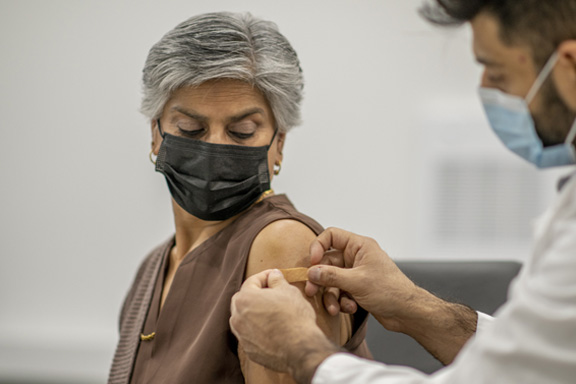Disclaimer: This article was published in 2023 and reflects the information available at that time.
Each year pharmacies routinely see an increase in demand for vaccination services as winter approaches. The recent surge in demand for pharmacist-administered vaccines has also seen a rise in the number of vaccine-related calls and incidents reported to PDL.
Commonly reported vaccination errors
- Administration of incorrect vaccine, e.g. high demand for influenza vaccines leading to assumptions and misunderstanding by pharmacy staff and patients with influenza vaccine inadvertently administered instead of the expected vaccine
- Incorrect vaccine for patient age, e.g. incidents occurring for children and over 65-year-olds
- Shoulder injury related to vaccine administration (SIRVA)
- Incorrect interval between vaccine doses, e.g. COVID-19 booster interval errors
- Administration of expired vaccines, e.g. COVID-19 vaccines, travel vaccines and meningococcal B
- Refusal by some GP clinics to administer a vaccine that has been stored in the patient’s refrigerator
The increase in reports may be associated with some pharmacists experiencing vaccination fatigue or making assumptions that past high numbers for this service mean that process review is unnecessary. While these incidents equate to a very small proportion of all vaccines being administered, they do highlight several areas of practice that may benefit from review and staff meetings.
Key considerations when vaccinating
- Ensure sufficient staffing to manage the demand.
- Verbally confirm the expected vaccine with the patient/parent/carer using an open question. For example, “As part of my checking process, please confirm which vaccine you expect to receive today?”.
- Always check the AIR before vaccinating every individual.
- Avoid dealing with multiple vaccine patients at once as confusion between different vaccines has been reported.
- Follow ATAGI, the Australian Immunisation Handbook and other best practice guidelines as wilful disregard may leave a pharmacist at risk of an incident or complaint.
- Check the age of the patient prior to vaccination to establish eligibility.
- Check the expiry of vaccines, keeping in mind the difference between thawed expiry and manufacturer expiry for COVID-19 vaccines.
- Check syringes for leakage prior to administration to prevent loss of vaccine and having to establish if re-vaccination is required.
- GP clinics have refused to administer vaccines inadvertently stored by patients in home refrigerators. Pharmacists should ensure patients are aware of this possibility and allow patients to make an informed decision to leave vaccines at the pharmacy or take them directly to the clinic.
- Familiarise yourself with vaccination injuries that could occur due to vaccination activities and your reporting obligations.
- Familiarise yourself with prevention strategies for needle stick injuries and protocols to follow when it’s occurred.
- Ensure that your pharmacy adheres to the ‘Strive for 5’ cold chain guidelines. Check that data loggers are present, in working order and are capturing the required data. Ensure that the temperature of the vaccine refrigerator is recorded twice a day.
- Ensure the ‘Strive for 5’ vaccine storage self-audit is completed annually as a minimum.
- Check the anaphylaxis kit has all items required and that all items are in date.
- Keep an up-to-date contact list for useful resources such as the local Public Health Unit, the Vaccine Operation Centre and the AIR.
- Ensure your vaccination knowledge is up to date and captured in your CPD plan. Regularly review your vaccination procedure to prevent complacency.
- Ensure that pharmacist and assistant First Aid and CPR certification is current as required by regulators.
- Stay current with vaccination legislation in your jurisdiction. The last few years have seen significant changes in the range of vaccines and the age indications that pharmacists are authorised to administer – and this varies greatly across states and territories. It is the pharmacist’s responsibility to ensure they understand and follow national and state legislation. Of note are the recent changes to the SA Vaccination Code.
PDL members can call 1300 854 838 for advice and incident support from one of our Professional Officers. Supporting our pharmacist members 24/7.



